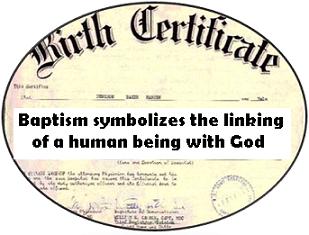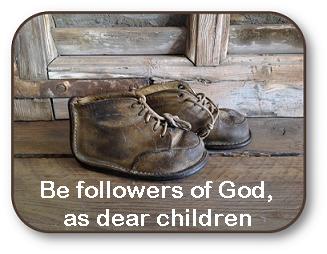The Church and the Holy Trinity: God the Father
The Church and the Holy Trinity: God the Father
Baptism symbolizes the linking of a human being with God. It is, in a sense, the Christian’s spiritual birth certificate which states their identity. The words of baptism refer to God as three Persons – “I baptize you in the name of the Father, and of the Son, and of the Holy Spirit.” The child of God relates to each of those three Persons.
It would be helpful if we pondered the particular ways in which each Person of the Godhead acts towards the church, and how we ought to act towards them.
How the Father relates to us⤒🔗
“There is one God, the Father, of whom are all things” (1 Cor 8:6). He is the Creator of the ends of the earth “who faints not, neither is weary; there is no searching of his understanding.”
An ancient creed states, “I believe in God the Father, Maker of heaven and earth.” As we read the Bible we discover that the Son and the Holy Spirit were also involved. But the Father is the originator of it all. The writer of the Epistle to the Hebrews says, “…through whom he created the worlds” (1:2). The “he” is the Father, and it is through his Son that he put creation into effect. Since he is Creator, he is also the ultimate lawgiver and judge (Genesis 2:15-17; 3:8-19).

The next thing we discover is the Father’s love. At key stages in creation the Genesis record states, “And he blessed them.” When Jesus wanted to show his disciples a model of Christian maturity he referred to the Father’s love. “Love your enemies and pray for those who persecute you, that you may be the sons of your Father who is in heaven” (Mat 5:44-45).
The fact that he loves enemies is underscored by the well-known words of John 3:16, “For God so loved the world that he gave his only begotten Son, that whoever believes in him should not perish but have everlasting life.” When the apostles were dismayed at the news of Jesus’ impending departure, he consoled them with the words, “The Father himself loves you” (John 16:27). In the benediction, it is the Father who is described as loving – “The love of God…” (2 Cor 13:14).
How does his love show? He appointed his Son to be the one mediator between himself and humanity (1 Tim 2:5), and relates to us through Christ. That was out of love for his Son as well as for us – Christ is “heir of all things” (Heb 1:2). It was for and through Christ he created all things (Col 1:16), and it is Christ who keeps them in existence (Heb 1:3). He has appointed Christ to be our judge (John 5:22-23). His love will never waver – “He will rest in his love” (Zeph 3:17).
Most importantly for us – he appointed his Son to be the Redeemer of his fallen people. The church (all God’s children in every age) is his gift to the Son – “Yours they were, and you gave them to me”, Jesus said (John 17:6). He sent his Son into the world, giving him a body (Luke 1:35) in which to perform the work assigned to him. In keeping with many promises (e.g. Isaiah 42:1-9) he strengthened Jesus for the work; he accepted his offering, then he raised him from the dead and took him to glory (Isaiah 53).
Now he has left these things on record for us (1 John 5:11) so that we may act on them. He draws people to Christ (John 6:44-45) and adopts them into his family (John 1:12-13, 20:19).
Our response to the Father←⤒🔗
Since we receive his blessings and are accountable to him, we ought first to confess our sin to him – “The carnal mind is enmity against God” (Rom 8:7). To live in denial of sin is intolerable pride. “Whoever conceals his transgressions will not prosper, but he who confesses and forsakes them will obtain mercy” (Pro 28:13). An honest approach and forgiveness of sins go together (Ps 32:2).
Then we must believe what he has said, especially about his Son Jesus (1 John 5:9-10) – that Jesus is the God-given Saviour for sinners. It is a grievous sin to disbelieve God and “make him a liar”. Receiving Jesus on the Father’s testimony makes the difference between eternal life and eternal death (1 John 5:12). That is his will. He is the joyful person in Jesus’ parables of the Good Shepherd, Lost Coin, and Prodigal Son – “There is joy in heaven over one sinner who repents…” (Luke 15).
It stands to reason that we should be grateful to him, and show it. He is due our wholehearted thanks for his mercy to us through Christ. That is the actual response of a saved sinner, and the church’s duty (Ps 116:1).
Alongside gratitude there is love for what God is. That shows in our longing for him, and loyalty to him – “The LORD is my portion; I promise to keep your words” (Ps 42:1-2; 119:57).
Living as his children←⤒🔗
Those who receive his Son, Jesus, become God’s children (John 1:12). It is the right thing for family members to love one another. The most important thing of all is to “love the Lord your God with all your heart and soul and mind and strength” (Mar 12:30). That implies a confidence that allows us to call on him as our Father – “When you pray, say, ‘Our Father…’” (Mat 6:9). It is the spirit of his Son, sometimes called the Spirit of adoption. Prayer is one of the main ways in which we can express that family spirit.
It contributes to a believer’s joy, and Jesus commends it – “Ask, and you shall receive, that your joy may be full” (John 16:24). As the Son of God, Jesus could say, “I always do the things that please him.” That is only right in any father/son relationship. We, too, should take care to please our Father at all times (1 Peter 1:17).

That childlike love and regard has another effect. Those we love we tend to imitate. The Spirit does not leave that to chance, but instructs us plainly: “Be followers of God, as dear children. And walk in love, as Christ loved us…” (Eph 5:1-2). For the great way to please the Father is to value and obey his Son.

Add new comment